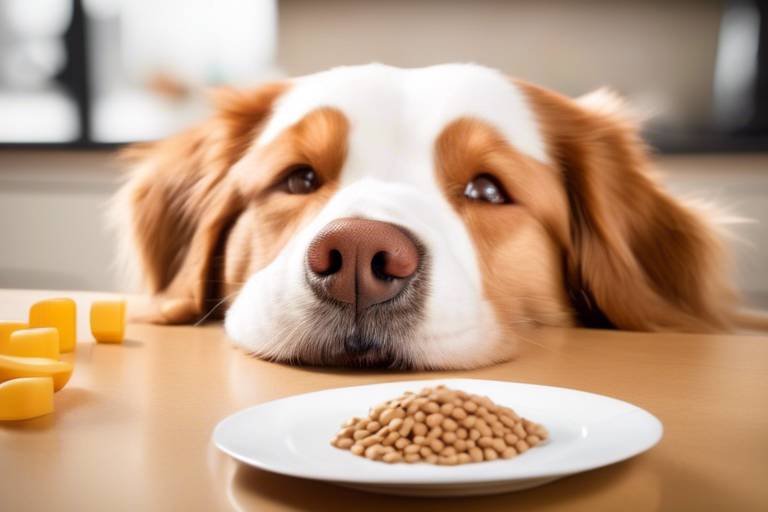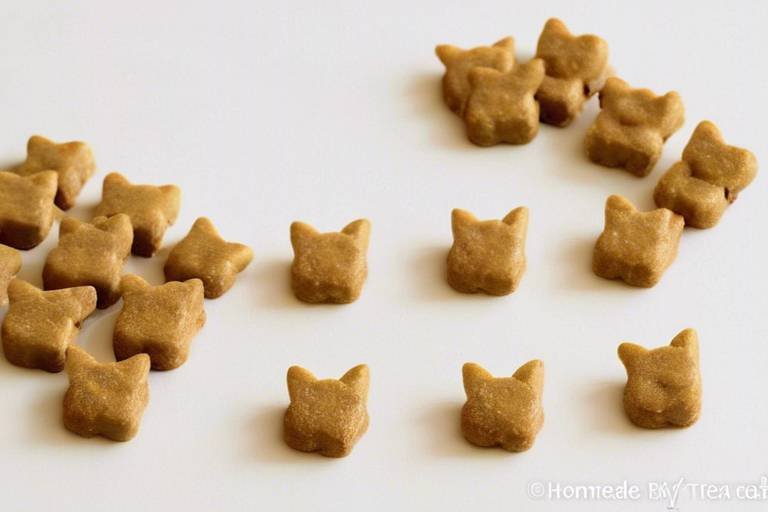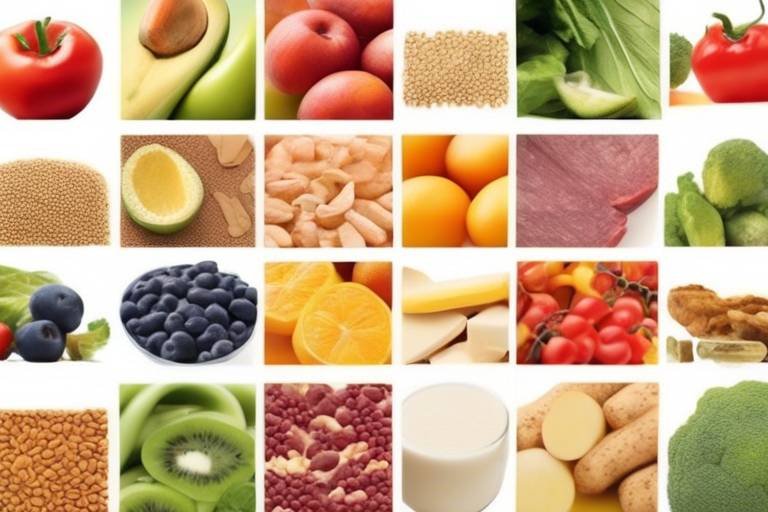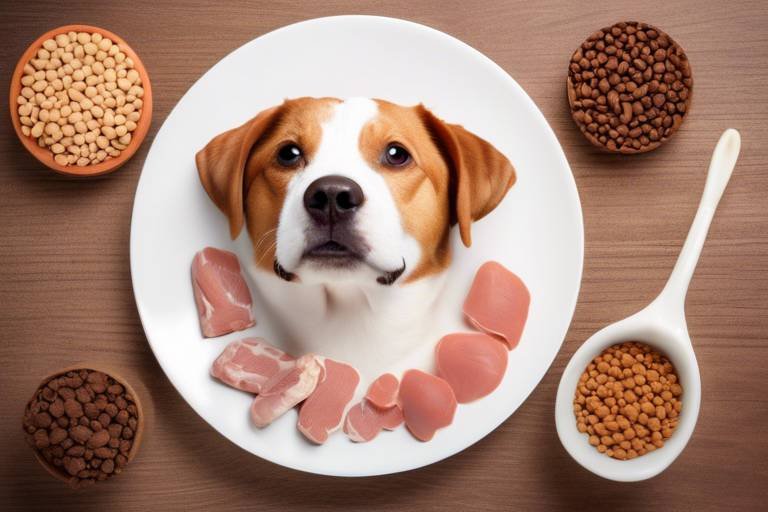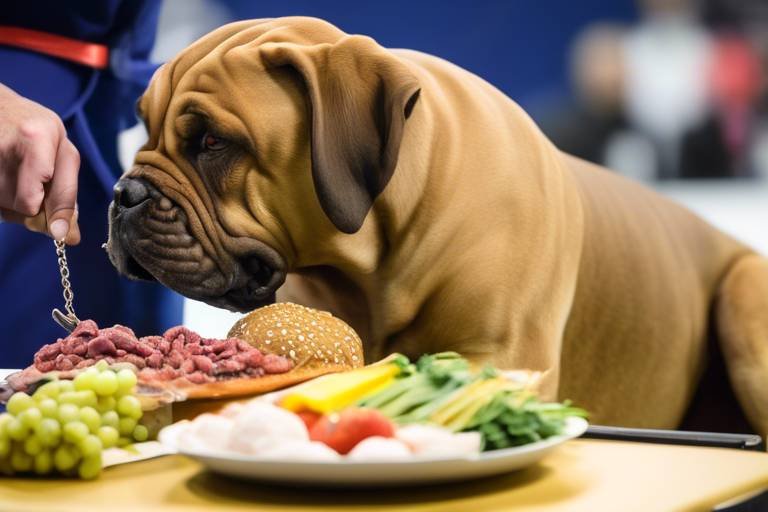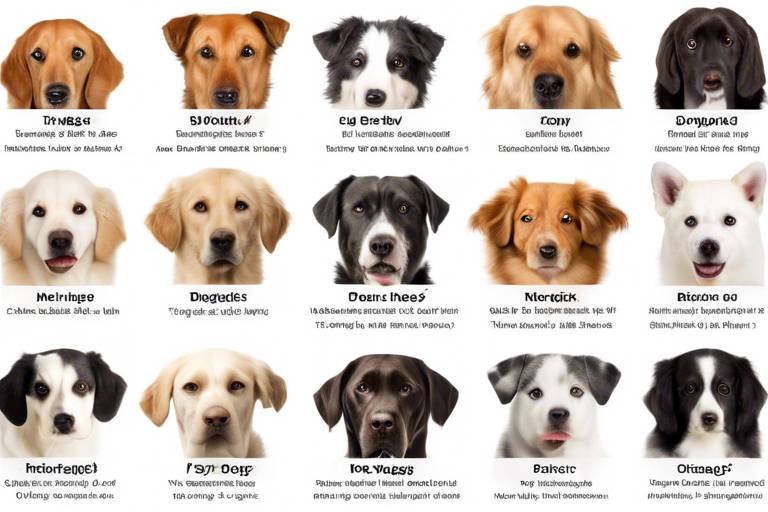The Importance of Nutrition for Puppies’ Growth
Nutrition plays a crucial role in the growth and development of puppies, much like the foundation of a house determines its strength and stability. Just as a strong foundation supports everything built upon it, the right nutrients ensure that your puppy grows into a healthy, vibrant adult dog. Puppies, being in a rapid growth phase, require a balanced diet rich in essential nutrients to fuel their development, support their immune system, and promote overall health.
Imagine a puppy as a little engine, constantly revving up and needing the right fuel to keep chugging along. The first few months of a puppy's life are critical, as this is when they develop their bones, muscles, and organs. Without the right nutrition, they may face a host of health issues later in life. This article will delve into the essential nutrients that puppies need, how to choose the right puppy food, and the best feeding practices to ensure that your furry friend gets the healthiest start possible.
Understanding the specific dietary needs of puppies can be overwhelming for new pet owners, but it doesn't have to be. By focusing on key nutrients such as proteins, fats, carbohydrates, vitamins, and minerals, you can make informed decisions that will lead to a happy and healthy puppy. For instance, proteins are vital for muscle development, while fats provide the energy needed for all those playful antics. Vitamins and minerals are equally important, as they support various bodily functions and promote a robust immune system.
As we explore the world of puppy nutrition, we’ll also address common dietary concerns that owners might encounter. From choosing the right type of food—whether dry, wet, or homemade—to understanding portion control and feeding schedules, each aspect plays a significant role in your puppy's growth journey. Remember, a well-nourished puppy is not just a happy puppy; they are also less likely to develop health problems as they grow older.
In summary, investing time and effort into understanding your puppy's nutritional needs is one of the best gifts you can offer them. It sets the stage for a long, healthy life filled with joy and companionship. So, buckle up as we dive deeper into the essential nutrients that will help your puppy thrive!
Understanding the key nutrients required for a puppy's growth, including proteins, fats, carbohydrates, vitamins, and minerals, is vital for their overall health and development during this crucial stage.
Selecting high-quality puppy food involves understanding labels, ingredients, and nutritional adequacy to meet the specific needs of growing dogs, ensuring they receive the best start possible.
This section compares the benefits and drawbacks of wet and dry puppy food, helping pet owners make informed decisions based on their puppy's preferences and nutritional requirements.
Wet food can provide additional hydration and palatability for puppies, making it an appealing choice for picky eaters while ensuring they receive essential nutrients for growth.
Dry food often supports dental health and is more convenient for storage and feeding, making it a practical option for many puppy owners focused on nutrition and health.
Exploring the option of homemade puppy meals, this section discusses the benefits and challenges of preparing balanced diets at home tailored to a puppy's specific nutritional needs.
Establishing proper feeding schedules and portion sizes is essential for puppies to maintain healthy growth and prevent obesity, ensuring they receive the right amount of food at appropriate intervals.
Understanding the recommended feeding frequency for puppies based on their age and breed size helps owners develop a routine that supports optimal growth and digestion.
This section provides practical tips for portion control, including measuring food and adjusting servings based on a puppy's growth, activity level, and overall health.
Identifying common nutritional deficiencies in puppies, such as calcium or omega fatty acids, helps owners recognize signs of inadequate nutrition and take corrective action for their pet's health.
Recognizing the signs of nutritional deficiencies, such as poor coat condition or lethargy, is crucial for early intervention and ensuring puppies receive the necessary nutrients for healthy development.
This section discusses strategies for preventing nutritional deficiencies in puppies through balanced diets, regular veterinary check-ups, and adjustments based on growth and activity levels.
1. What should I look for in puppy food?
Look for high-quality ingredients, a good balance of protein, fat, and carbohydrates, and ensure it meets AAFCO standards for growth and reproduction.
2. How often should I feed my puppy?
Puppies typically need to be fed 3-4 times a day, depending on their age and breed size.
3. Can I give my puppy homemade meals?
Yes, but ensure the meals are balanced and meet their nutritional needs. Consult with a vet for guidance.

Essential Nutrients for Puppies
This article explores the critical role of nutrition in the growth and development of puppies, highlighting essential nutrients, feeding practices, and common dietary concerns to ensure a healthy start in life.
Understanding the key nutrients required for a puppy's growth is vital for their overall health and development during this crucial stage. Puppies are like little sponges, soaking up everything they need to grow strong and healthy. Just as we need a balanced diet to thrive, so do our furry companions. The essential nutrients include proteins, fats, carbohydrates, vitamins, and minerals. Each of these plays a unique role in supporting the rapid growth and energy demands of a young dog.
Proteins are the building blocks of life. They help in the development of muscles, skin, and coat. Puppies require more protein than adult dogs because they are growing so quickly. It’s important to choose high-quality protein sources, such as chicken, beef, or fish, which provide the essential amino acids necessary for their development. A good rule of thumb is to look for puppy food that contains at least 22% protein.
Next up are fats. While some people might think of fats as something to avoid, they are crucial for puppies. Fats provide energy and help in the absorption of vitamins. They also contribute to a shiny coat and healthy skin. Look for foods that contain omega-3 and omega-6 fatty acids, which can support brain development and overall health.
Carbohydrates are often misunderstood. While they are not as crucial as proteins and fats, they provide a quick source of energy. Whole grains, fruits, and vegetables are excellent carbohydrate sources that can also provide fiber, aiding in digestion. However, it’s essential to ensure that these are not the main ingredient in puppy food; a balanced approach is key.
Vitamins and minerals are like the tiny gears in a well-oiled machine. They support various bodily functions and help in the overall development of your puppy. For example, calcium and phosphorus are vital for bone development, while vitamins A, D, and E play roles in immune function, vision, and skin health. It’s critical to ensure that your puppy’s diet includes a proper balance of these nutrients, as deficiencies can lead to serious health issues.
| Nutrient | Function | Sources |
|---|---|---|
| Proteins | Muscle development, skin, and coat health | Chicken, beef, fish |
| Fats | Energy, vitamin absorption, coat health | Fish oil, chicken fat, flaxseed |
| Carbohydrates | Quick energy, digestion | Whole grains, fruits, vegetables |
| Vitamins | Support immune function, vision, skin health | Vegetables, fruits, fortified foods |
| Minerals | Bone development, overall health | Meat, dairy, leafy greens |
In summary, providing a balanced diet filled with these essential nutrients is crucial for your puppy's growth and development. It’s like giving them a strong foundation to build upon as they grow into healthy adults. Always consult with your veterinarian to ensure that your puppy is receiving the right balance of nutrients tailored to their specific needs, as every puppy is unique.
Q1: How much protein should my puppy have?
A1: Puppies typically need at least 22% protein in their diet for optimal growth.
Q2: Can I feed my puppy homemade meals?
A2: Yes, but ensure that the meals are balanced and meet all nutritional requirements.
Q3: What are signs of nutritional deficiencies in puppies?
A3: Common signs include poor coat condition, lethargy, and slow growth.
Q4: How often should I feed my puppy?
A4: Puppies should be fed three to four times a day, depending on their age and size.

Choosing the Right Puppy Food
Choosing the right puppy food is akin to selecting the perfect foundation for a house; it sets the stage for everything that follows. Your puppy's diet is crucial for their growth and development, impacting everything from their energy levels to their overall health. With so many options available on the market, it can be overwhelming to navigate through the myriad of choices. However, understanding what to look for can simplify the process immensely.
First and foremost, it’s essential to read the nutrition labels carefully. Look for foods that are specifically formulated for puppies, as their nutritional needs differ significantly from adult dogs. Puppy food should contain a higher percentage of protein and fat to support their rapid growth. Ingredients should be listed in order of quantity, so ensure that high-quality protein sources, like chicken or lamb, are at the top of the list. Avoid foods with fillers such as corn or soy, which offer little nutritional value.
Moreover, consider the nutritional adequacy of the food. The Association of American Feed Control Officials (AAFCO) provides guidelines for pet food manufacturers, and products labeled as “complete and balanced” meet these standards. This means they contain all the essential nutrients your puppy needs for healthy growth. If you're ever in doubt, consulting with your veterinarian can provide tailored advice based on your puppy's specific needs.
Another important factor to consider is whether to choose wet or dry food. Each type has its advantages and disadvantages. For instance, wet food can be more palatable and hydrating, which is beneficial for puppies that are picky eaters. On the other hand, dry food is often more convenient and can help maintain dental health. The decision may ultimately depend on your puppy's preferences and any specific health considerations.
If you’re leaning towards homemade meals, it’s crucial to ensure that they are balanced and meet all the nutritional requirements. This can be a rewarding option, but it requires careful planning and knowledge about what constitutes a complete diet for puppies. Consulting with a veterinarian or a pet nutritionist can help you craft a balanced meal plan that caters to your puppy’s unique needs.
In summary, choosing the right puppy food is not just about filling a bowl; it's about laying the groundwork for a healthy, vibrant life. By focusing on high-quality ingredients, understanding nutritional adequacy, and considering your puppy’s individual preferences, you can make informed decisions that will benefit your furry friend for years to come.
- What should I look for in puppy food? Look for high-quality protein sources, essential fatty acids, and a balance of vitamins and minerals. Ensure the food is labeled as "complete and balanced" by AAFCO.
- Can I feed my puppy adult dog food? No, adult dog food does not contain the necessary nutrients that puppies require for growth and development.
- How do I know if my puppy is getting enough food? Monitor your puppy's weight and energy levels. Consult with your vet to determine the appropriate portion sizes based on your puppy's specific breed and age.
- Is homemade puppy food a good option? It can be, but it requires careful planning to ensure it meets all nutritional needs. Consulting a veterinarian is recommended.
Wet vs. Dry Food
When it comes to choosing the right food for your puppy, the debate between wet food and dry food can feel overwhelming. Both options have their unique benefits and potential drawbacks, and understanding these can help you make an informed decision that suits your furry friend’s needs. Let's dive deeper into this topic!
Starting with wet food, one of its most significant advantages is the added moisture content. Puppies, especially those who are transitioning from nursing, often need extra hydration. Wet food can be a great way to ensure they’re getting enough water in their diet. Moreover, the rich aroma and texture of wet food can make it more appealing to picky eaters. Puppies are notorious for being finicky, so if your little one turns their nose up at dry kibble, wet food might just be the solution you need.
However, while wet food has its perks, there are some considerations to keep in mind. It often comes in cans or pouches, which means it can be less convenient for storage and feeding. Additionally, wet food is typically more expensive than dry food and has a shorter shelf life once opened. So, if you’re looking for a budget-friendly option that can be stored for longer periods, you might want to consider dry food.
On the other hand, dry food offers some distinct advantages as well. One of the most notable benefits is its ability to support dental health. The crunchiness of kibble can help reduce plaque and tartar buildup, promoting healthier teeth and gums. Plus, dry food is easier to measure and store, making it a practical choice for busy pet owners. You can simply scoop out the right amount and store the bag without worrying about spoilage.
That said, not all dry foods are created equal. It’s essential to choose high-quality brands that use quality ingredients. Some lower-quality kibble may contain fillers or artificial additives that are not beneficial for your puppy’s health. Therefore, when selecting dry food, always check the ingredient list and ensure it meets the nutritional standards for growing puppies.
To help you weigh the pros and cons, here’s a quick comparison:
| Feature | Wet Food | Dry Food |
|---|---|---|
| Moisture Content | High | Low |
| Dental Health | Minimal Benefit | Supports Dental Health |
| Storage | Less Convenient | Easy to Store |
| Cost | Generally More Expensive | More Budget-Friendly |
| Palatability | Highly Palatable | Varies by Brand |
Ultimately, the choice between wet and dry food often comes down to your puppy’s preferences and specific dietary needs. Some pet owners even choose to combine both types, providing the best of both worlds! However, it’s crucial to monitor your puppy's reaction to their food and consult with your veterinarian to ensure they’re getting the right balance of nutrients.
- Can I mix wet and dry food? Yes! Many pet owners mix both to provide variety and balance in their puppy's diet.
- Is one better than the other for puppies? It depends on your puppy's preferences and health needs. Consult your vet for personalized advice.
- How do I transition my puppy to a new food? Gradually mix the new food with the old food over a week to avoid digestive upset.
Benefits of Wet Food
When it comes to feeding your puppy, the choice between wet and dry food is a big one, and wet food often stands out for several compelling reasons. One of the primary benefits of wet food is its high moisture content. Puppies, especially those who are still developing, need to stay hydrated, and wet food can help with this. It’s like giving them a refreshing drink mixed with their meal, ensuring they get enough fluids without even realizing it!
Another significant advantage is the palatability of wet food. Many puppies are picky eaters, and the rich aroma and texture of wet food can entice even the fussiest of pups to dig in. Imagine trying to get a toddler to eat their vegetables; sometimes, a little creativity and flavor can go a long way! Wet food can be a great way to make mealtime enjoyable, ensuring your puppy is excited about their food and gets the nutrition they need.
Additionally, wet food is often packed with essential nutrients that are crucial for a puppy's growth and development. The process of canning or packaging wet food typically preserves the vitamins and minerals, meaning your puppy can benefit from a well-rounded diet. For instance, many wet foods contain higher levels of protein, which is vital for muscle development and energy. This can be particularly beneficial for active breeds or those growing at a rapid pace.
Moreover, wet food can be an excellent choice for puppies with specific health concerns. For instance, if a puppy is recovering from surgery or has dental issues, the soft texture of wet food makes it easier to eat and digest. It’s like offering a comforting soup when you’re feeling under the weather; it’s gentle on the stomach and easy to consume.
While there are many benefits, it’s essential to balance wet food with other dietary options to ensure your puppy gets a complete nutrition profile. Here’s a quick overview of some of the key benefits of wet food:
| Benefit | Description |
|---|---|
| Hydration | High moisture content helps keep your puppy hydrated. |
| Palatability | Enticing aroma and texture encourage picky eaters to enjoy their meals. |
| Nutrient-rich | Often contains higher levels of protein and essential vitamins. |
| Digestibility | Soft texture makes it easier for puppies with health issues to eat. |
In conclusion, while wet food has many advantages, it’s important to consider your puppy’s individual needs and preferences. Mixing wet food with dry kibble can also provide a variety of textures and flavors, keeping mealtime exciting and ensuring they receive a balanced diet. So, if your furry friend seems a bit uninterested in their regular kibble, why not give wet food a try? It could be the tasty solution to their mealtime woes!
Advantages of Dry Food
When it comes to feeding your puppy, dry food often stands out as a practical and beneficial option. One of the primary advantages is its contribution to dental health. The crunchy texture of dry kibble helps to reduce plaque and tartar buildup on your puppy's teeth, promoting a healthier mouth. Think of it as a natural toothbrush that your puppy can enjoy during mealtime!
Moreover, dry food is incredibly convenient for pet owners. It has a longer shelf life compared to wet food, which means you can buy in bulk without worrying about spoilage. This not only saves you trips to the store but also allows you to maintain a consistent diet for your puppy. Imagine having a pantry stocked with nutritious meals ready to go whenever your furry friend gets hungry!
Another significant advantage is the ease of portion control. With dry food, it’s easier to measure out the exact amount your puppy needs based on their age, weight, and activity level. This helps prevent overfeeding, which can lead to obesity—an issue that many puppies face if not monitored closely. By using measuring cups or scales, you can ensure that your puppy is getting the right amount of food, making your feeding routine both effective and efficient.
Dry food also tends to be more cost-effective in the long run. While the initial investment may seem higher than wet food, the cost per serving is generally lower, allowing you to stretch your budget further. Plus, since it’s less messy than wet food, cleanup becomes a breeze, letting you spend more quality time with your puppy instead of scrubbing the floor!
Lastly, many dry dog foods are formulated with essential nutrients that support your puppy's growth and development. They often include a blend of proteins, fats, and carbohydrates, ensuring that your puppy receives a balanced diet. You can easily find high-quality brands that meet the specific dietary needs of your growing pup, allowing you to feel confident in your choice.
In summary, dry food offers numerous benefits, including:
- Improved dental health
- Convenience and longer shelf life
- Easy portion control
- Cost-effectiveness
- Balanced nutrition
So, if you’re considering options for your puppy's diet, dry food could be the way to go. With its myriad of advantages, it not only simplifies feeding but also supports your puppy’s overall health and well-being.
Q: Can I mix dry food with wet food?
A: Yes, many pet owners choose to mix dry and wet food to provide variety and enhance palatability. Just make sure to adjust the portions accordingly to avoid overfeeding.
Q: How do I know which dry food is best for my puppy?
A: Look for high-quality brands that list meat as the first ingredient and contain essential nutrients. Consulting with your veterinarian can also provide personalized recommendations based on your puppy's specific needs.
Q: How often should I feed my puppy dry food?
A: Puppies typically need to be fed 3-4 times a day until they are about six months old. After that, you can gradually transition to two meals a day.
Homemade Puppy Meals
When it comes to feeding your furry friend, the idea of preparing can be both exciting and daunting. Imagine whipping up a delicious meal for your puppy, knowing exactly what goes into it—no mystery ingredients, just pure, wholesome goodness! But before you dive into the kitchen, let’s explore the benefits and challenges of preparing these meals.
One of the primary advantages of homemade puppy meals is the ability to control the ingredients. You can select high-quality proteins, fresh vegetables, and healthy fats, ensuring your puppy gets a balanced diet tailored to their specific needs. For instance, using lean meats like chicken or turkey, combined with veggies such as carrots and peas, can create a nutritious meal that supports growth. However, it’s crucial to ensure that these meals are well-balanced. Puppies require a specific ratio of proteins, fats, carbohydrates, vitamins, and minerals to thrive. A well-rounded meal might look like this:
| Ingredient | Function |
|---|---|
| Lean Protein (e.g., chicken, turkey) | Supports muscle development |
| Carbohydrates (e.g., brown rice, sweet potatoes) | Provides energy |
| Vegetables (e.g., carrots, peas) | Offers essential vitamins and minerals |
| Healthy Fats (e.g., fish oil) | Promotes healthy skin and coat |
However, while the idea of homemade meals sounds fantastic, there are challenges to consider. It can be time-consuming to prepare, and without proper knowledge, you might unintentionally create an unbalanced diet. That’s why it’s essential to consult with a veterinarian or a pet nutritionist before making the switch. They can provide guidance on the nutritional requirements specific to your puppy's breed, age, and activity level.
Moreover, it’s vital to avoid certain ingredients that can be harmful to dogs, such as onions, garlic, chocolate, and grapes. These foods can lead to serious health issues, so always double-check before tossing anything into the pot. It’s like being a chef in a high-stakes kitchen—one wrong ingredient can spoil the entire dish!
Lastly, transitioning your puppy to homemade meals should be done gradually. Start by mixing a small amount of the homemade food with their current diet to avoid digestive issues. Monitor your puppy’s reaction and adjust as necessary. With careful planning and consultation, homemade puppy meals can be a rewarding way to ensure your furry friend gets the nutrition they need while enjoying delicious meals.
- Can I feed my puppy only homemade food? It’s best to consult with a veterinarian to ensure that homemade meals meet all of your puppy’s nutritional needs.
- What ingredients should I avoid in homemade puppy meals? Avoid ingredients like onions, garlic, chocolate, and grapes, as they can be toxic to dogs.
- How do I transition my puppy to homemade meals? Gradually mix homemade food with their current diet to prevent digestive upset.
- Is it more expensive to prepare homemade puppy meals? It can be, depending on the ingredients you choose, but it allows for greater control over quality.

Feeding Schedules and Portions
Establishing proper feeding schedules and portion sizes is crucial for ensuring that puppies grow up healthy and strong. Puppies, much like children, require a consistent routine to thrive. When you think about it, feeding your puppy at the same times each day is like setting a clock for their growth and development. It provides them with the security they need and helps regulate their digestion. The right schedule can prevent overeating or underfeeding, which are common pitfalls for new puppy owners.
So, how do you determine the best feeding schedule for your furry friend? Generally, puppies need to eat more frequently than adult dogs due to their rapid growth rates and high energy levels. For instance, younger puppies (under six months) typically require three to four meals per day. This frequency helps ensure that they are getting enough nutrients to support their growth. As they approach six months, you can gradually transition to two meals a day. This change not only simplifies your routine but also helps your puppy adjust to their adult feeding schedule.
When it comes to portion control, it’s essential to tailor the amount of food to your puppy's specific needs. Factors such as age, breed size, and activity level play significant roles in determining how much food your puppy should consume. For example, an active puppy will require more calories than a laid-back one. To help you manage portions effectively, refer to the feeding guidelines provided by your puppy's food manufacturer. These guidelines usually offer a range based on the puppy's weight and age, giving you a solid starting point.
| Age of Puppy | Feeding Frequency | Approximate Portion Size |
|---|---|---|
| 8 weeks - 3 months | 4 meals/day | 1/4 - 1/2 cup per meal |
| 3 - 6 months | 3 meals/day | 1/2 - 1 cup per meal |
| 6 - 12 months | 2 meals/day | 1 - 2 cups per meal |
It’s also important to monitor your puppy’s weight regularly. If you notice them gaining too much weight, you might need to adjust their portions accordingly. Conversely, if they seem to be losing weight or are overly thin, it may be time to increase their food intake. Remember, just like humans, puppies can have different metabolisms, so what works for one might not work for another. Keeping an eye on their body condition score can help you make necessary adjustments.
In addition to portion sizes, consider the timing of their meals. Puppies thrive on routine, so establishing a consistent feeding time not only helps with digestion but also aids in house training. By feeding your puppy at the same times each day, you can predict when they’ll need to go outside, making the whole process smoother for both of you.
Lastly, always consult with your veterinarian for personalized advice tailored to your puppy’s unique needs. They can provide insights based on your puppy’s breed, health status, and lifestyle, ensuring that you’re giving them the best start possible. After all, a well-fed puppy is a happy puppy, and setting them up for success in their early years will pay off in their overall health and well-being.
- How often should I feed my puppy? Puppies typically need to eat 3-4 times a day until they are about 6 months old, after which you can transition to 2 meals a day.
- What should I do if my puppy is overweight? Reduce their portion sizes and consult your vet for a tailored feeding plan.
- Can I give my puppy treats? Yes, but treats should not exceed 10% of their daily caloric intake.
Frequency of Feeding
When it comes to the frequency of feeding your puppy, it's essential to understand that this is not just about filling their bowl; it’s about laying the foundation for a healthy future. Puppies are like little sponges, soaking up nutrients and energy to fuel their rapid growth and playful antics. But how often should you feed them? The answer largely depends on their age, breed size, and individual needs. Generally, younger puppies require more frequent meals to support their high energy levels and developing bodies.
For instance, a typical guideline is to feed puppies under six months old three to four times a day. This frequent feeding schedule helps maintain their energy levels and keeps their metabolism running smoothly. As they grow and transition into adulthood, you can gradually decrease the feeding frequency. By the time they reach six months, many puppies can thrive on two to three meals per day.
Here's a quick breakdown of feeding frequency based on age:
| Age of Puppy | Feeding Frequency |
|---|---|
| 8 weeks to 6 months | 3 to 4 times a day |
| 6 months to 1 year | 2 to 3 times a day |
| 1 year and older | 1 to 2 times a day |
It's also vital to be consistent with feeding times. Puppies thrive on routine, and having set meal times helps regulate their digestive systems. Think of it as creating a little schedule that your puppy can rely on, much like a school bell for kids. You wouldn’t want your child’s school day to start at random times, right? The same goes for our furry friends!
Another thing to consider is the portion size. Feeding too much at once can lead to digestive issues, while too little may not provide enough nutrients for their growth. It’s a delicate balance, but with a little observation, you can adjust portions based on your puppy's appetite and energy levels. Remember, if your puppy seems overly hungry or is gaining weight too quickly, it might be time to reassess how much and how often you’re feeding them.
In conclusion, establishing a proper feeding frequency is crucial for your puppy’s development. By understanding their needs and sticking to a routine, you’ll not only support their growth but also foster a healthy relationship with food that can last a lifetime. After all, a well-fed puppy is a happy puppy!
Portion Control Tips
When it comes to feeding your puppy, portion control is not just a good idea; it's essential for their health and well-being. Puppies are like little sponges, soaking up nutrients to fuel their rapid growth and playfulness. However, providing too much food can lead to obesity, which can cause a plethora of health issues down the road. So, how do you ensure your furry friend is getting just the right amount? Here are some tips to help you navigate the world of puppy portions.
First off, understanding your puppy's needs based on their age, breed, and activity level is crucial. For instance, larger breeds may require more food than smaller breeds, but they also need to be careful about their growth rate to avoid joint issues. A good rule of thumb is to consult with your veterinarian to determine the appropriate daily calorie intake for your puppy. This will give you a solid foundation to work from.
Next, consider using a measuring cup or a kitchen scale to ensure accuracy. It might seem tedious at first, but trust me, it pays off in the long run. By measuring out the food, you can avoid the temptation to "eyeball" it, which often leads to overfeeding. Once you have a set portion size, stick to it! Consistency is key in developing a healthy feeding routine.
Another effective tactic is to divide the daily food allowance into multiple meals throughout the day. Puppies typically need to eat three to four times a day, depending on their age. This not only helps prevent overeating in one sitting but also aids in digestion. You can set specific times for meals, creating a routine that your puppy will come to expect. Just imagine how much they look forward to meal times, wagging their tails in anticipation!
It’s also important to monitor your puppy’s weight and body condition regularly. You can do this by feeling their ribs; you should be able to feel them without too much pressure, but they shouldn’t be protruding. If you notice your puppy is gaining weight too quickly, it might be time to adjust portion sizes. On the flip side, if they seem too thin, you may need to increase their food intake slightly. Keeping a close eye on their body condition is like having a roadmap to their health.
Lastly, be cautious with treats. While it’s tempting to spoil your puppy with goodies, treats should only make up about 10% of their daily caloric intake. Too many treats can quickly add up and disrupt their balanced diet. Instead, opt for healthy, low-calorie treats and consider using a portion of their daily kibble as training treats. This way, you can reward them without overindulging!
In summary, portion control is a vital part of your puppy’s diet that can set the stage for a healthy life. By understanding their nutritional needs, measuring food accurately, dividing meals, monitoring weight, and being mindful of treats, you can ensure your puppy grows into a happy and healthy dog.
- How often should I feed my puppy? It's generally recommended to feed puppies three to four times a day based on their age and breed size.
- What should I do if my puppy is overweight? Consult your veterinarian for tailored advice, and consider adjusting portion sizes and increasing exercise.
- Can I give my puppy table scraps? While some human foods are safe, it's best to avoid table scraps as they can lead to unhealthy eating habits.
- How can I tell if I'm feeding my puppy the right amount? Regularly check their weight and body condition; you should be able to feel their ribs without excess fat covering.

Common Nutritional Deficiencies
When it comes to raising a puppy, nutrition is paramount. Just like humans, puppies require a balanced diet to thrive. However, many puppy owners may unknowingly overlook certain essential nutrients, leading to nutritional deficiencies that can impact their furry friend's growth and overall health. Understanding these deficiencies is crucial for ensuring that your puppy has a strong start in life.
One of the most common deficiencies observed in puppies is a lack of calcium. Calcium is vital for developing strong bones and teeth. Without adequate calcium, puppies can experience stunted growth and skeletal deformities. Symptoms may include a soft or deformed skull, bowed legs, and dental issues. To combat this, consider incorporating calcium-rich foods or supplements as recommended by your veterinarian.
Another significant deficiency is that of omega fatty acids, which play a crucial role in maintaining a healthy coat and skin. Puppies lacking these essential fats may develop dry skin, dull fur, and even allergies. Omega-3 and Omega-6 fatty acids can be found in fish oil and certain seeds, making it easy to add these nutrients to their diet.
Additionally, vitamin deficiencies, particularly vitamins A, D, and E, can lead to a host of health issues. Vitamin A is crucial for vision and immune function, while vitamin D is essential for calcium absorption. A deficiency in vitamin E can result in muscle weakness and reproductive issues. To avoid these deficiencies, ensure your puppy's food contains a balanced mix of vitamins, and consult with your vet if you're unsure.
It's also important to recognize that some puppies may have specific dietary needs based on their breed or individual health conditions. For instance, large breed puppies may require different nutrient ratios compared to smaller breeds to prevent joint problems. Monitoring your puppy's growth and development closely can help you identify any potential deficiencies early on.
To help you better understand the common nutritional deficiencies in puppies, here’s a quick reference table:
| Nutrient | Common Deficiency Symptoms | Sources |
|---|---|---|
| Calcium | Stunted growth, skeletal deformities | Dairy products, green leafy vegetables, supplements |
| Omega Fatty Acids | Dry skin, dull coat, allergies | Fish oil, flaxseed, certain dog foods |
| Vitamin A | Poor vision, weakened immune system | Liver, fish, carrots |
| Vitamin D | Poor bone health, calcium absorption issues | Fatty fish, egg yolks, fortified foods |
| Vitamin E | Muscle weakness, reproductive issues | Nuts, seeds, green leafy vegetables |
Recognizing the signs of nutritional deficiencies is vital for early intervention. If you notice any unusual behaviors or health issues in your puppy, consult your veterinarian immediately. They can perform tests and help tailor a diet that meets your puppy's unique needs, ensuring they grow up healthy and strong.
Q: How can I tell if my puppy is getting enough nutrients?
A: Regular vet check-ups, observing your puppy's energy levels, coat condition, and growth patterns can help determine if they're getting enough nutrients.
Q: Can I give my puppy human food to supplement their diet?
A: Some human foods are safe for puppies, but it's essential to consult your vet before introducing any new food to avoid potential toxicities or imbalances.
Q: What should I do if I suspect my puppy has a nutritional deficiency?
A: Contact your veterinarian immediately for advice on dietary adjustments and potential supplementation.
Signs of Nutritional Deficiencies
This article explores the critical role of nutrition in the growth and development of puppies, highlighting essential nutrients, feeding practices, and common dietary concerns to ensure a healthy start in life.
Understanding the key nutrients required for a puppy's growth, including proteins, fats, carbohydrates, vitamins, and minerals, is vital for their overall health and development during this crucial stage.
Selecting high-quality puppy food involves understanding labels, ingredients, and nutritional adequacy to meet the specific needs of growing dogs, ensuring they receive the best start possible.
This section compares the benefits and drawbacks of wet and dry puppy food, helping pet owners make informed decisions based on their puppy's preferences and nutritional requirements.
Wet food can provide additional hydration and palatability for puppies, making it an appealing choice for picky eaters while ensuring they receive essential nutrients for growth.
Dry food often supports dental health and is more convenient for storage and feeding, making it a practical option for many puppy owners focused on nutrition and health.
Exploring the option of homemade puppy meals, this section discusses the benefits and challenges of preparing balanced diets at home tailored to a puppy's specific nutritional needs.
Establishing proper feeding schedules and portion sizes is essential for puppies to maintain healthy growth and prevent obesity, ensuring they receive the right amount of food at appropriate intervals.
Understanding the recommended feeding frequency for puppies based on their age and breed size helps owners develop a routine that supports optimal growth and digestion.
This section provides practical tips for portion control, including measuring food and adjusting servings based on a puppy's growth, activity level, and overall health.
Identifying common nutritional deficiencies in puppies, such as calcium or omega fatty acids, helps owners recognize signs of inadequate nutrition and take corrective action for their pet's health.
Recognizing the signs of nutritional deficiencies in puppies is crucial for early intervention and ensuring they receive the necessary nutrients for healthy development. Puppies can’t tell us when something is off, so it’s up to us to be vigilant. Common indicators include:
- Poor Coat Condition: A shiny, healthy coat is often a reflection of good nutrition. If your puppy’s fur appears dull, dry, or flaky, it might be a sign of a deficiency in essential fatty acids or other nutrients.
- Lethargy: Puppies are usually bundles of energy. If yours seems unusually tired or disinterested in play, it could indicate that they are not getting the right balance of nutrients.
- Digestive Issues: Frequent diarrhea or constipation can signal that your puppy’s diet is lacking in fiber or balance, affecting their overall health.
- Stunted Growth: If your puppy isn’t growing as expected, it might be due to inadequate protein or calorie intake, which are vital for their development.
These signs can serve as red flags, prompting you to reassess your puppy's diet. If you notice any of these issues, it’s important to consult with a veterinarian to ensure your puppy receives the right nutrients. Early detection can make a significant difference in your puppy's health and well-being.
This section discusses strategies for preventing nutritional deficiencies in puppies through balanced diets, regular veterinary check-ups, and adjustments based on growth and activity levels.
Q: How often should I feed my puppy?
A: Puppies typically need to be fed 3-4 times a day, depending on their age and breed size. As they grow, you can gradually reduce the frequency to twice a day.
Q: Can I give my puppy table scraps?
A: While some human foods are safe for puppies, many can be harmful. It’s best to stick to a balanced puppy diet and consult your vet before introducing new foods.
Q: How can I tell if my puppy is getting enough nutrients?
A: A healthy puppy will have a shiny coat, good energy levels, and consistent growth. Regular vet check-ups can help monitor their nutritional status.
Preventing Nutritional Deficiencies
When it comes to ensuring your puppy grows up strong and healthy, preventing nutritional deficiencies is key. Just like a house needs a solid foundation, your puppy's health relies on a balanced diet packed with the right nutrients. One of the best ways to achieve this is by providing a variety of foods that meet their specific nutritional needs. But how do you know if your puppy is getting everything they need? Regular veterinary check-ups are essential. Your vet can help identify any potential deficiencies and recommend dietary adjustments to keep your furry friend thriving.
Another effective strategy is to incorporate a mix of high-quality commercial puppy food and fresh, whole ingredients. This not only adds variety to your puppy's diet but also ensures they receive a comprehensive range of nutrients. For example, adding small amounts of cooked vegetables, lean meats, or fish can enhance their meals significantly. Just remember, moderation is crucial! Too much of a good thing can lead to other health issues.
It’s also important to pay attention to your puppy’s growth and activity levels. Are they energetic and playful? Or do they seem lethargic and disinterested in play? These behaviors can be indicators of nutritional deficiencies. For instance, if your puppy is lacking omega fatty acids, you might notice a dull coat or dry skin. In contrast, a deficiency in calcium can lead to stunted growth and weakened bones. Recognizing these signs early can make a world of difference!
To further prevent nutritional deficiencies, consider the following tips:
- Choose high-quality puppy food that meets AAFCO standards.
- Rotate protein sources in your puppy's diet to provide a wider range of nutrients.
- Monitor your puppy’s weight and adjust portions accordingly to prevent obesity.
- Consult with your veterinarian about appropriate supplements if needed.
In summary, preventing nutritional deficiencies in puppies is all about balance, variety, and vigilance. By providing a well-rounded diet, keeping an eye on your puppy's health, and making necessary adjustments, you can help ensure they grow into a happy and healthy adult dog.
1. What are the signs that my puppy may have a nutritional deficiency?
Common signs include poor coat condition, lethargy, and slow growth. If you notice these symptoms, consult your veterinarian.
2. Can I feed my puppy homemade meals?
Yes, but it's crucial to ensure that the meals are balanced and meet all of your puppy's nutritional needs. Consulting a veterinarian or a pet nutritionist can help.
3. How often should I feed my puppy?
Puppies typically require more frequent meals than adult dogs. Generally, feeding them 3-4 times a day is recommended, depending on their age and breed.
4. Is it okay to give my puppy treats?
Absolutely! Treats can be a great way to reward your puppy, but make sure they are healthy and make up no more than 10% of their daily caloric intake.
5. Should I be concerned about feeding my puppy grain-free food?
Grain-free diets can be beneficial for some dogs, but they may not be necessary for all. It's essential to discuss any dietary changes with your veterinarian to ensure your puppy's needs are met.
Frequently Asked Questions
- What are the essential nutrients my puppy needs for healthy growth?
Puppies require a balanced diet that includes proteins, fats, carbohydrates, vitamins, and minerals. Proteins are crucial for muscle development, fats provide energy, carbohydrates support digestion, and vitamins and minerals are essential for overall health and immune function.
- How do I choose the right puppy food?
Selecting the right puppy food involves looking at the ingredients and understanding the nutritional adequacy of the product. High-quality puppy food should meet the AAFCO standards for growth and development, ensuring it’s tailored to your puppy’s specific needs.
- Is wet food better than dry food for puppies?
It really depends on your puppy's preferences and needs! Wet food can be more palatable and hydrating, making it great for picky eaters, while dry food can help with dental health and is easier to store. Both have their pros and cons, so consider what works best for your furry friend!
- Can I make homemade meals for my puppy?
Absolutely! Preparing homemade puppy meals can be a great way to ensure your puppy gets a balanced diet tailored to their needs. Just make sure to consult with a veterinarian to ensure you’re providing all the necessary nutrients and avoiding harmful ingredients.
- How often should I feed my puppy?
The frequency of feeding depends on your puppy's age and breed size. Generally, younger puppies require more frequent meals (3-4 times a day), while older puppies can transition to 2 meals per day. Establishing a routine helps with digestion and growth.
- What are some tips for controlling portion sizes?
To control portions, measure your puppy's food using a measuring cup and adjust servings based on their growth and activity level. Regularly check their weight and consult your vet to make sure they’re on track for healthy growth.
- What are the signs of nutritional deficiencies in puppies?
Common signs of nutritional deficiencies include a poor coat condition, lethargy, and slow growth. If you notice these signs, it’s crucial to consult with your veterinarian to assess your puppy’s diet and make necessary adjustments.
- How can I prevent nutritional deficiencies in my puppy?
Preventing nutritional deficiencies involves providing a balanced diet, ensuring regular veterinary check-ups, and adjusting your puppy's food based on their growth and activity level. Keeping a close eye on their health will help you catch any issues early!







